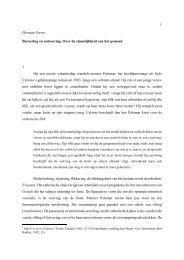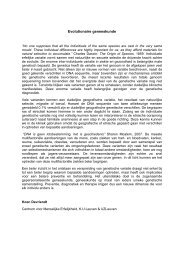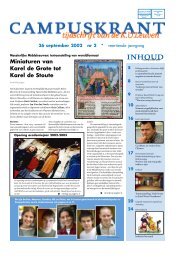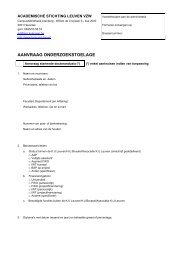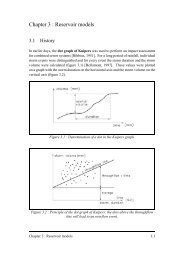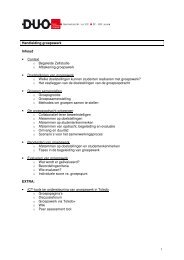EQUALITY GUIdE - KU Leuven
EQUALITY GUIdE - KU Leuven
EQUALITY GUIdE - KU Leuven
Create successful ePaper yourself
Turn your PDF publications into a flip-book with our unique Google optimized e-Paper software.
Chapter 4 ! Scientific communication 195<br />
Table 24: The different gender topics which are seen as important, which ask for more exploration<br />
and which must be incorporated in training.<br />
Which topic is important for the<br />
participant personally?<br />
Selection criteria:<br />
On what topics are researchers<br />
evaluated: number of publications,<br />
and what else? In reality? What do<br />
young researchers have to take<br />
into account if they want to plan<br />
their career as well as possible?<br />
Assessment private life-work:<br />
How do you combine family and<br />
work?<br />
Job characteristics that go beyond<br />
gender:<br />
What is related to gender, and<br />
what is not? What can be done<br />
and what cannot? What is normal<br />
and what is discrimination? How<br />
can you see the difference? Looking<br />
at things through the perspective<br />
of gender? Generation problem<br />
vs. gender problem?<br />
On which topic do participants wish further<br />
information?<br />
Best practice:<br />
What do other universities for example in<br />
foreign countries do? Sharing experiences.<br />
Evolution in the gender problems:<br />
Is there a progression? In other words, is<br />
there something we can do about the gender<br />
problems?<br />
Stressing the distinctive features as a<br />
woman:<br />
How do we appear as women to men? How<br />
do we have to make ourselves known in the<br />
best way to maximize our chances of having<br />
a successful career? Which influence does<br />
the social image of working women and<br />
educated women have? Which role can female<br />
researchers adopt without losing their<br />
individual character as a woman?<br />
Selection criteria:<br />
What is exactly going on now? How can<br />
female researchers obtain that education (a<br />
field they excel in and find important) is no<br />
longer a disadvantage for their careers?<br />
How to stimulate innovation at the university?<br />
What can be measured, and what cannot?<br />
How to fill in the social role without<br />
being disadvantaged in career opportunities?<br />
Gender awareness:<br />
What does looking at things through a gender<br />
perspective mean? How can we discover<br />
where gender has an influence? What<br />
does a male perspective look like and what<br />
about the female perspective? Which components<br />
does it consist of? How can we<br />
raise the awareness of the people around<br />
us? How can we make female researchers<br />
aware before they are promoted?<br />
Delegating:<br />
How does that work, how do female top<br />
managers do it? How do they plan their<br />
work and family?<br />
University information:<br />
What is the equal opportunity policy at the<br />
university? Which measures are taken? And<br />
how are they doing in comparison with other<br />
universities?<br />
Which topic do participants want<br />
to see incorporated in a training<br />
course?<br />
Learn to look at things through a<br />
gender perspective:<br />
How do men and women look at<br />
things through a gender perspective?<br />
And when?<br />
Influence the representation positively:<br />
How can you, as a female researcher,<br />
communicate in a way<br />
that is positive for your career, that<br />
makes you feel good and that allows<br />
you to grow in an academic<br />
environment? When do you do<br />
things as an individual and when<br />
do you do them collectively?<br />
Female characteristics:<br />
Which female characteristics often<br />
have a negative/positive influence?<br />
And how can you use your female<br />
qualities in a positive way? How<br />
can you have a positive impact as<br />
a woman?<br />
Make a gender-neutral examination:<br />
Do we as women look differently to<br />
male students than to female students,<br />
are we aware of that?<br />
Selection criteria:<br />
Can we influence these criteria,<br />
and how? What can we do in practice?



